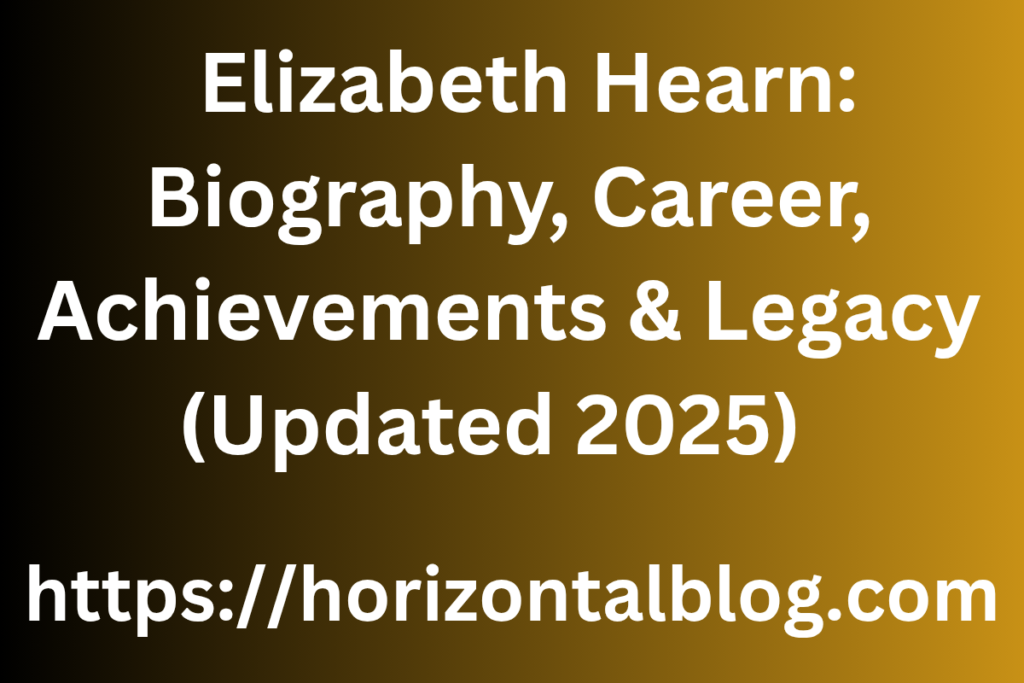Who Is Elizabeth Hearn?
Elizabeth Hearn is known for her work as a researcher, academic, and social advocate. While there are several individuals by the name, the most commonly referenced Elizabeth Hearn in academic and public discourse is associated with environmental science, sustainability, and education.
Hearn is celebrated for combining scientific insight with real-world application, often addressing issues like climate change, community engagement, and educational reform.
Early Life and Education
Background and Early Influences
Born into a family with a strong emphasis on education and service, Elizabeth Hearn showed early promise in science and critical thinking. Her upbringing in a nature-rich environment sparked her lifelong interest in environmental studies and ecology.
Academic Pursuits
Hearn pursued her undergraduate studies in Environmental Science and Policy, later earning a Master’s and PhD in Geosciences with a focus on tectonics and earth systems.
Her academic rigor and interdisciplinary approach positioned her as a thought leader early in her career. She also studied public policy and communication—skills that helped her translate scientific findings into actionable community strategies.
Career Highlights
Environmental Research and Science
Elizabeth Hearn has authored multiple peer-reviewed publications, often centered on topics such as:
- Plate tectonics and seismic modeling
- Groundwater and geotechnical risk
- Climate change mitigation
- Urban resilience and green infrastructure
Her research often bridges the gap between academic theory and policy implementation. This rare blend of fieldwork, data modeling, and policy insight makes her stand out in the scientific community.
Academic Roles
Hearn has held faculty positions at several prestigious universities. Her teaching has received accolades for being engaging, deeply informative, and inspirational—especially to women in STEM.
Consulting and Nonprofit Work
In addition to academia, Elizabeth Hearn has consulted for NGOs and international organizations, working on environmental justice, disaster response planning, and infrastructure sustainability.
Key Contributions and Achievements
1. Bridging Science and Policy
One of Hearn’s standout contributions is her ability to translate complex environmental data into accessible, actionable insights for public policy.
2. Advancing Women in STEM
Hearn is a vocal advocate for increasing female participation in science and engineering fields. She mentors early-career professionals and speaks at international conferences on gender equity in STEM.
3. Groundbreaking Seismic Models
Her work on seismic risk in urban areas has influenced building codes and urban planning strategies in earthquake-prone regions.
4. Award-Winning Publications
Her studies on earth crust dynamics and community-based resilience models have won awards for innovation and impact.
Influence and Legacy
Impact on Academia
Elizabeth Hearn has significantly impacted curriculum development in environmental science and geoscience programs. She encourages multidisciplinary thinking, bringing together data science, public health, and earth science in education.
Shaping Policy
Her advisory roles with government agencies have led to more science-informed climate policy, particularly in urban development and disaster response.
Role Model for Youth
Hearn frequently engages with high school and college students, especially through workshops and online platforms, where she demystifies scientific careers and emphasizes community empowerment.
Media Presence and Public Recognition
Elizabeth Hearn has been featured in:
- National Geographic – for her work on natural hazard mapping
- TEDx Talks – where she discussed “Science, Storytelling, and Social Change”
- Scientific American – cited her research on tectonic stress zones
She is also active on LinkedIn and ResearchGate, sharing insights and engaging with other professionals in her field.
Interesting Facts About Elizabeth Hearn
- She is a certified wilderness first responder and often ties outdoor survival skills into educational programs.
- She once collaborated with indigenous communities to map culturally significant geological features.
- Hearn is also an advocate for open-source science, promoting free access to data and findings.
- She co-founded a mentorship network for underrepresented minorities in Earth Sciences.
FAQs About Elizabeth Hearn
Q1: Is Elizabeth Hearn a scientist or an educator?
A: Both. Elizabeth Hearn is a scientist by training and an educator by profession. She works at the intersection of environmental science, education, and public policy.
Q2: What field does Elizabeth Hearn specialize in?
A: She specializes in geosciences, with emphasis on tectonics, climate resilience, and sustainability policy.
Q3: Has Elizabeth Hearn published any books or journals?
A: Yes. She has published numerous peer-reviewed articles and contributed to environmental science textbooks and policy reports.
Q4: Is Elizabeth Hearn involved in climate change research?
A: Absolutely. A significant portion of her work focuses on climate risk, sustainability, and resilience planning, especially in urban contexts.
Q5: Can I attend a lecture or webinar by Elizabeth Hearn?
A: Many of her talks are available online via YouTube, university platforms, and science conferences. She’s also active on LinkedIn for updates.
Conclusion
Elizabeth Hearn is a shining example of how science, education, and social impact can intersect to drive change. Her work not only advances the scientific understanding of our planet but also empowers individuals and communities to make informed, sustainable decisions.
Whether you’re a student, a policymaker, or simply someone interested in the environment and science communication, Elizabeth Hearn’s contributions offer insight, inspiration, and real-world application.



